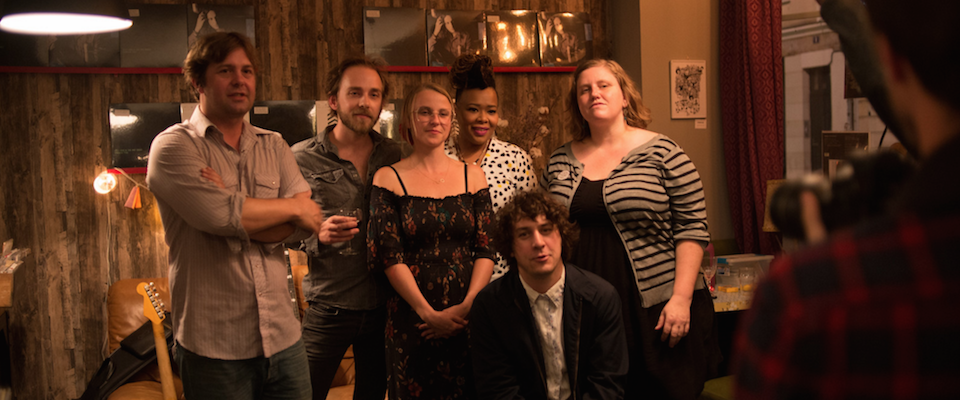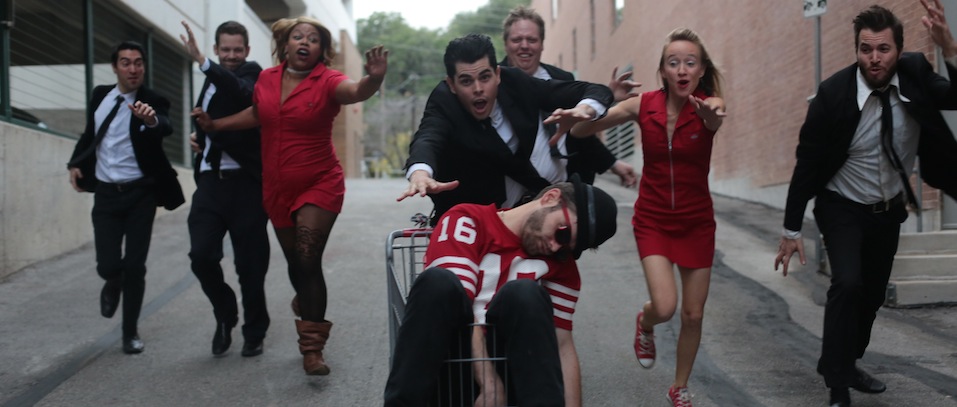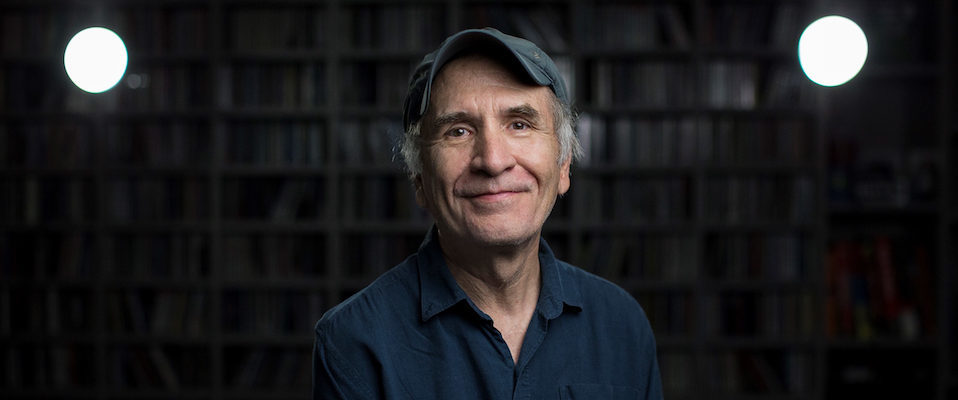Spoon Gets The Fan Treatment In A New Podcast
by Jacquie Fuller
“We need to start a Spoon podcast,” I said to Art Levy sometime around 2017. At pre-pandemic KUTX, Art and I sat beside one another – only a cubicle half-wall and a potted plant between us. Every so often, we’d pop our heads over the half-wall like prairie dogs to make a Mr. Show reference or discuss our favorite band. We’d nerd out on the latter so often that we started thinking that our Spoon chats might make for a fun podcast. We went so far as to draft up a proposal for our boss, but our assigned jobs always got in the way.
For three years, a Slack or email (we really need to make that podcast!) would occasionally float between us. Then, one night while scrolling Instagram, I stumbled upon an about-to-launch Spoon podcast called I Turn My Podcast On. I forwarded it to Art: “Someone beat us to it.” Was I a little bummed? Of course! Until I heard it.
* * *
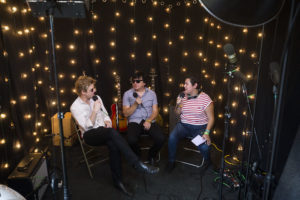
Though Spoon has been my favorite band since ’97-ish, it never occurred to me to connect online with other Spoon fans. Aside from going to shows and making mixed CDs for friends, my experience of music tended to be solitary. I knew the official Spoon message board existed, but I never participated. If I had, I would’ve encountered the podcast’s host and producer, Tyler Darling.
Darling didn’t learn about the band until 2005, via an interview in Guitar Player that moved him to buy their Gimmie Fiction release sound-unheard. But he didn’t join the message board until 2009, when he first saw the band live. It was then that, Darling told me by email, “I realized I needed to own every recording produced by the band, and seek out their message board to get tracks from fans.”
“I’ve never met up with anyone in real life from the site,” he said, “but there are several people over the years that I’ve traded tracks with.” The board still exists, but with the rise of social media, participation dwindled to only the die-hards. Darling calls the board “a cool time capsule with lots of dead MediaFire links and all kinds of opinions and conversations.” One of those die-hard conversations?: Darling proposing a podcast about his favorite band.
* * *
That’s where it began for Darling. He kicked around ideas with a few fellow members, but eventually the thread went quiet for a year and a half.

Then the pandemic hit, and the thread picked up again: “So this is still happening … stay tuned!”
The pandemic presented the perfect opportunity: Darling had a bit more time on his hands and his favorite band was, like so many others, grounded. Early on, Darling had emailed frontman Britt Daniel. There were polite back-and-forths and Daniel offered to retweet the podcast once it came to fruition. By the time of the pandemic, as Darling prepared to record the first episode, Daniel changed his tune, agreeing to be interviewed for the podcast. “It was supposed to be one interview,” Darling told me, “and I had all these questions I was trying to get through.” But once they started talking, Daniel proposed that they discuss each album, and so Darling split the interview up over several weeks. “Was I surprised? Absolutely.”
Had Art and I actually made our Spoon podcast, we would’ve arranged it through Spoon’s management, and recorded it in a high-tech studio by producers with years of broadcast experience. That’s not to say it wouldn’t have been an authentic effort from two fans. A podcast like this is every music fan’s dream: the opportunity to directly ask your music hero all your burning questions. But with I Turn My Podcast On, Darling approaches his subject with a delightfully starry-eyed enthusiasm that the traditional path beats out of most of us.
Darling is not a broadcast professional. He’s a 31-year-old father of two elementary-aged kids. By day, he works for a housing non-profit. He lives in rural Wisconsin, and records the podcast in his garage, sometimes pausing to sneer at the nuclear dicks speeding down the road in their oversized pickups. As a host, he brings a certain Midwestern, aw-shucks vibe that makes you wish you were actually there with him, say, debating the track order of Girls Can Tell over a six pack of Leinies. Darling brings his experience as a musician to bear, too, but never alienates non-musicians – where he lacks the legal rights to isolate a part of a song, Song Exploder-style, he’ll unabashedly sing it for us instead.
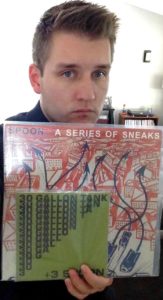
Darling’s conversations with Britt Daniel are the heart of the podcast, but he doesn’t stop there. With bonus episodes, he interviews members of the Spoon cosmos, from Peek-A-Boo Records’ Travis Higdon to producer Mike McCarthy. With these bonus interviews, our understanding of the band expands, through a deeper understanding of how these players shaped their work. Darling augments the interviews with bonus tracks, like the original of “Me & The Bean” (Spoon’s version was a cover), as well as “When We Go FM,” Spoon’s contribution to a 1993 compilation from UT Austin’s KVRX (where Daniel was a staffer) that celebrated the station’s move to an FM frequency.
Darling is not an Austinite – his focus is on the band, not the city that birthed it. (In one episode, he refers to the video for Spoon’s “Jealousy” as having been filmed on a bathroom floor, but he isn’t privy to which bathroom floor. If he ever visits Austin, I’ll buy him a beer at Hole in the Wall.) But place is unavoidable in the story of Spoon. Even if it wasn’t Darling’s intention, what begins to emerge in the podcast is a sort of love letter to a particular moment in Austin’s music history – one less storied than Austin’s Armadillo years, but still deeply cherished by many (including me). From the conjuring of defunct Austin bands like Teen Titans and venues like The Electric Lounge to the story of a stellar prank Daniel pulled on an unnamed ska band (I have my suspicions, but won’t say who), these interviews are a fascinating glimpse of the Austin music scene in Spoon’s early years.
At the time of this writing, Darling has covered five total Spoon releases with eleven episodes, including fan responses for each album. In Spoon’s chronology, we’re now in the early aughts, when the band first began its ascent from near-failure (dropped by their first major label) into the totally unassuming rock stars we know today (my favorite-ever analogy: writer Steven Hyden comparing the band to the Spurs’ Tim Duncan). As Darling cranks out episodes – between parenthood and pairing Wisconsinites with affordable housing – there will be more goodies in store, especially with the release of Spoon’s 10th LP coming down the pike. I Turn My Podcast On might be a bit too dense for the Spoon uninitiated – it is, after all, a podcast for fans. But it’s all the more enjoyable because it’s made by one.
You can hear I Turn My Podcast On wherever you get your podcasts. While you’re there, check out some of ours, too.

